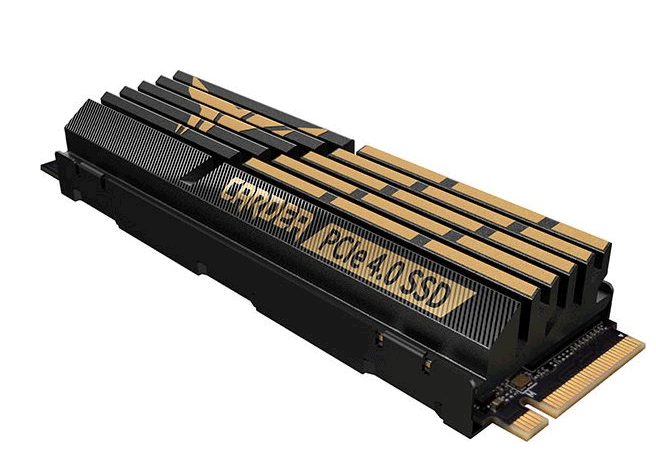Final Words & Conclusion
Final Words & Conclusion
Pooh, things are moving fast now with PCIe Gen 4.0 top-tier performance. This was the second Phison controller PS5018-E18 based product we got our hands-on, and again we can see some shocking numbers. And yes, this really is a breathtaking amount of read/write performance. That said, in this conclusion, we are going to talk a little about relativity. Breaking that 7 GB/sec marker isn't necessarily going to make your game PC a lot faster (and that is the honest truth). TeamGroup however is offering a pretty extraordinary product. Certainly, at 21 cents per GB it's not cheap, but considering what you get it isn't expensive either. Yes, you pay a premium for this 7 GB/sec NVMe SSD, but at these rates, I'm drawing that good old value card here as this one as well comes with cooling options. The 440A is a super-fast SSD, TLC written, offers heaps of endurance, and has a 5-year warranty. At that money, you'd be hard-pressed to not like this product, eh? See, I like the 'Amazon' based companies; they are more or less price fighters and bring that extra mile towards the consumer at a more fair price.
Do you really need 7 GB/sec storage?
Not really. period.
This is a premium performance product, often synthetically measured, and you'd need serious professional workloads to get the best out of it. Your PC isn't going to boot faster as your OS is the bottleneck, your PC games might load a fraction of a second faster, your application load up just as quickly as an NVMe SSD with reads/writes in the 2/3 GB/sec marker. Guys, this is the honest truth. However, the same folk that purchases a GeForce RTX 3090 or Radeon RX 6900 XT combined with some sort of Core i9 or Ryzen 9 series processor, it's for those guys where that last fraction of performance matters, whether that is realistic or not, I'll leave open to discussion.
Endurance
Seen over last-gen Rocket 4 products endurance went down, however, at still outstanding values. We explained it many times already, endurance, the number of times NAND cells can be written before they burst and shatter into small pieces (well, they just die and are mapped out, any data present on that cell is written to a healthy one). Bigger volume sizes mean more NAND cells; more NAND cells thus increase endurance. For the 2TB model, you'll get a rated 1400 TBW; the 1 TB model marks 700 TB written. So how long does a 1400 TWB storage unit last before NAND flash cells go the way of the dodo? Well, if you are a really extreme user, you might be writing 50 GB per day (normal users likely won't even write that per week), but based on that value, 50GB x 365 days= 18.25 TB per year written. So that's over 76 years of usage, half that for the 1TB SSD. And again, writing 50 GB per day is a very ambitious number.
Performance
You cannot deny that this is a fast product. Overall throughput in reading performance goes from 3GB to even 7 GB/sec. Trace tests showed the performance to be slightly average, though, and I do have a theory on that. The more NAND layers there are, the slower access times seem to get? We're talking milli-fractions of a second here, but we measured an average of 49 microseconds on average as the access time for the fastest SSD we've ever tested. The older generation with fewer stacks sat (at best) at 41 microseconds. It's a trend we have been seeing for a while now, and the number rises with more and layers; yep, that would be latency. We deem our trace tests to be among the best in our test suite. Other than that, on all levels, the SSD ranks fantastically.
Concluding
These are exciting times in the NAND industry, we've only moved away from the SATA3 era a few years ago, here 500 MB/sec was the norm. Today we test 7000 MB/sec for almost identical prices, and that my fellow gurus is evolution and progress. That's why I so love this industry it just never stops and never stops to amaze me. Relativity then is a bitch, you are not going to need 7 GB/sec SSD reading and writing performance on your storage unit anytime soon, but if you want it, you can ... and the fun thing is that TeamGroup does offer that for 21 Cents per GB (including a heatsink and Graphene pad). That price is similar to Samsungs 980 PRO 2TB, an SSD series that now is slower and offers less (but still good) endurance. The quality of this SSD is excellent, the performance (given the right workloads) really good. This was the first in a series of reviews on the 7 GB/sec models, and yeah, we can not be disappointed. Team managed even to pass the Samsung 980 PRO .. yep Team, a relatively small company versus multi-national Samsung. As stated, we honestly think you're not going to notice the real-world effect and difference between a 3GB/sec or a 7GB/sec SSD anytime soon. If an application loads up in a split second, then a fraction of that split second is what it will be faster. For complex workloads like video editing, capturing, etc., that's where the money is better spent, of course. Other than that somewhat personal remark, all lights are green, TLC, high endurance, price, warranty. There's little to complain about; perhaps the one grievance I have is that registration of this product to receive the 5-years warranty is mandatory. The nagging ends there, though.
Please do seat the SSD under a mobo- or the supplied heatsink. If it would be running hot, if it would be thermal throttling. Seated under a heatsink, the controller status reports numbers under 70 Degrees C. Of course, to get the best out of it, you'll need a PCIe Gen 4 infrastructure, and at the time of writing, that means a compatible Ryzen processor on, say, a B550 or X570 chipset-based platform. Recently released and also capable would be Intel RKL processors and Series 5000 motherboards with PCIe gen 4.0 support. The A440 has sufficiently been buffered by a pseudo-SLC write cache and 1 GB of DRAM buffer for the 1TB model, 2GB for the 2 TB model. We did not run into TLC write holes over continuous 64GB stretches of writes. The unit makes you shiver in performance given the right conditions, and for the rest of them, you are down to more normal high-end class NVMe performance on some workloads. NVMe protocol v1.4; this SSD is among the first to utilize the new NVMe 1.4 protocol. You do not need to install any new drivers; just make sure your OS is updated. Then install and format the SSD, and you're ready to go full throttle. Team backs the storage unit with a proper five years / or the listed TBW value. At 21 cents per GB, Team offers an impressive product series. Whether or not you'd ever need this performance level is another thing. But the good thing about the industry pushing forward is that in the lower end and mainstream segment, things speed up as a result as well. I mean, 3 GB/sec NVMe SSD is getting the norm these days and already is considered as somewhat mainstream; yeah, think about that for a while. If you want it, this is a proper deal, if prices come down a bit more in the future, heck I'd even grant it a value award. For now, though, recommended.
Recommended Downloads



